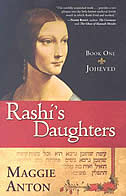Rashi's Daughters: Joheved, by Maggie Anton
 Like far too many Christians, I would have to confess that my knowledge of Judaism pretty much left off where the Bible ended and picked up with the Holocaust, with no real sense (despite my history degree and broad reading) of what Jews were doing for the 2000 years in between, except wandering around without a homeland and getting persecuted by bad Christians. Until a couple of years ago, I wouldn't have recognized the name of Rashi, the most famous medieval commentator on the Talmud (or even have been able to explain exactly what the Talmud was).
Like far too many Christians, I would have to confess that my knowledge of Judaism pretty much left off where the Bible ended and picked up with the Holocaust, with no real sense (despite my history degree and broad reading) of what Jews were doing for the 2000 years in between, except wandering around without a homeland and getting persecuted by bad Christians. Until a couple of years ago, I wouldn't have recognized the name of Rashi, the most famous medieval commentator on the Talmud (or even have been able to explain exactly what the Talmud was).I still wouldn't say I know a lot about, say, medieval European Judaism, but I've become much more curious and interested in filling in this gap in my historical knowledge, which is why I eagerly picked up Maggie Anton's first volume in her series Rashi's Daughters: Joheved.
The series does what it says on the tin: it brings to life the family of Rashi (Salomon Ben Isaac, as he was known in his lifetime), devout Jews living in France in the eleventh century, through the characters of the women in the family. The oldest daughter is studious Joheved, who wants to study Talmud like a boy. Anton has done a wonderful job of recreating the time and place of the story, drawing us into a world that most readers, like me, probably know little about.
I do have quibbles with the book: Anton's knowledge of the period is so thorough and detailed that her research often jumps front and centre, drawing attention away from the characters and plot. The dialogue is often forced to carry the weight of heavy-handed exposition, which keeps the reader at arm's length. But despite these flaws, the first volume of Rashi's Daughters is well worth reading for its glimpses into women's lives in eleventh-century France, Jewish life at the period, and the role that Talmud study played in that life. I will be looking out for the next novel in this series.

3 Comments:
Most of what I know about Judaism between Christ and Hitler, I learned from The Book of Abraham by Marek Halter.
But it's one of my all-time favorite books, that I reread every decade or so.
And...oh, my goodness...I just realized Halter has a whole bunch of books. How funny. It never occurred to me to look.
When, the heck, am I supposed to get to all these? I don't read as fast as you do!
I've only read Marek Halter's Biblical-era novels, so that's some catching up I have to do too!
Post a Comment
<< Home